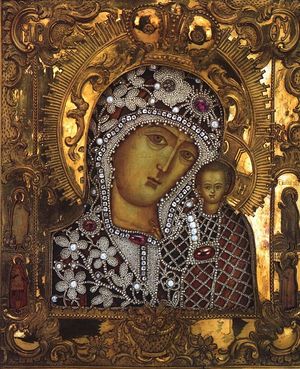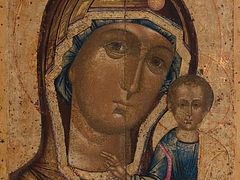 Icon of the Kazan Mother of God Let this mind be in you, which was also in Christ Jesus: Who, being in the form of God, thought it not robbery to be equal with God: But made himself of no reputation, and took upon him the form of a servant, and was made in the likeness of men: And being found in fashion as a man, he humbled himself, and became obedient unto death, even the death of the cross. Wherefore God also hath highly exalted him, and given him a name which is above every name... (Philippians. 2:5–9).
Icon of the Kazan Mother of God Let this mind be in you, which was also in Christ Jesus: Who, being in the form of God, thought it not robbery to be equal with God: But made himself of no reputation, and took upon him the form of a servant, and was made in the likeness of men: And being found in fashion as a man, he humbled himself, and became obedient unto death, even the death of the cross. Wherefore God also hath highly exalted him, and given him a name which is above every name... (Philippians. 2:5–9).
It is salvific for us to know, my beloved children in Christ, why the Holy Church turns our attention at the Liturgy on the feasts of the Theotokos to these apostolic words, which speak of how God the Father exalted His Divine Son for the sake of His unutterable humility. That is why the Lord also exalted the Most Pure Mother of God and gave her a name, that is, such great glory as He has never given to any of His created rational beings. It is not without reason that the Orthodox Church glorifies her as more honorable than the Cherubim and beyond compare more glorious than the Seraphim. However, the Mother of God received this glory because in her great humility she became like the Savior Himself. The words that the Most Pure Mother of God spoke to Righteous Elizabeth, For Thou hast looked upon the lowliness of Thy handmaiden (Lk. 1:48), are testimony to this.
We ask, beloved ones: what salvific conclusion we can draw from this? We are also called to the great heavenly glory of the Kingdom of Christ, to His eternal paradisal blessedness. Father, I will that they also, whom thou hast given me, be with me where I am; that they may behold my glory, which thou hast given me... before the foundation of the world (Jn. 7:24), said the Lord in His High Priestly prayer. But the path to our exaltation, to our future heavenly glory, is the same path upon which the Lord, His Most Pure Mother, and all the saints passed. This path is narrow, sorrowful, and thorny—it is the path of Christlike humility.
Therefore, if we want to follow our divine purpose, we must practice the words of the apostle Paul: consenting to the humble (Rom. 12:16);1 that is, we should emulate the humble; we should have humility. In it consists the foundation and entire essence of Christianity according to the teaching of St. Macarius the Egyptian. It is our rebirth, renewal, and salvation. For it alone does the Lord grant us His saving grace; for it pleased Him to proclaim through His Revelation: The Lord resisteth the proud, and giveth grace to the humble (Jas. 4:6; cf. 1 Pet. 5:5, Prov. 3:34).
And we need humility not only for our future heavenly glory. It is needful to us also during our temporal lives to deliver us from all of our misfortunes. From this it can be understood why the holy fathers of the Church testify that all tribulations are sent to us by the Lord in order to humble us, and through humility unite us to Himself, because pride separates us from God and deprives us not only of future blessedness, but also of temporal happiness.
This is what we must direct our attention to. And because the Most Pure Mother of God is our first Intercessor and Deliverer from all our misfortunes, it is clear that all our prayers to her to save us from all our afflictions, and that we might receive every temporal blessing, should have humility behind them. She turns directly away from the proud and greatly loves the humble, as Church tradition testifies; or more precisely, the lives of holy people testify.
In this instance let the great ascetic of the Russian Church, Hieroschemamonk Macarius of the Nizhny Novgorod Caves Monastery, be for us a salvific example. While still a simple monk of the St. Macarius of Zheltovodsk Monastery (also in the Nizhny Novgorod governate) he stood out for his lofty Christian life. There were two traits that particularly distinguished him from the other monks. He had great humility; and a not a word of judgment against his neighbors every left his lips. For humility consists in never judging anyone and accusing only yourself. And he also prayed with particular fervency to the Most Pure Mother of God. Well, a serious trial befell him—he came down with a fatal illness. Only minutes were left of his life, the brothers had come to say farewell to the dying monk, and the abbot was already reading the prayers for the departure of the soul. Then Fr. Macarius suddenly fell asleep, and he saw a wondrous vision. Radiant youths came for his soul. The dying monk begged them tearfully to leave him among the living so that he could repent of his sins as he needed before God. But the angels said to him, “Follow us”. At these words the monk’s soul left his body and was presented by the angels to a place of hell’s torments, where sinners were begging, like the Gospel rich man, to have their lips moistened with drops of water that they might have but a little relief from the terrible flames of hell. The monk’s soul experienced such horror that cannot be expressed in words. But then the angels raised his soul into the heavenly mansions and presented it to the paradisal chambers of the Heavenly Queen herself. He saw the Heavenly Queen and the numberless Heavenly Hosts, who wondrously sang the Church hymn, “All of creation rejoiceth in Thee, O Thou who are full of grace.” Then the Mother of God turned to the soul of Macarius and said, “Go back for fifteen years to your earthly habitation and for the sake of the prayers of St. Macarius, serve at the altar of his holy monastery.” At that moment the dead monk Macarius was resurrected and arose perfectly healthy, to the great amazement of all the brothers. Gathering in the monastery church, they glorified God for His great miracle with the hymn, Glory to God in the highest and on earth peace, good will toward men (Lk. 2:14).
Let us also, beloved brothers and sisters in Christ, emulate this great monk who acquired Christlike humility, and let us also pray to the Most Pure Mother of God with humility as he did. And not only with humility, but also with love let us prayer to her, remembering how she suffered so terribly for us, for the sake of our salvation, when she stood at the Cross on which her Divine Son was crucified. Let us not forget that the Mother of God continues even now to suffer for us when we seriously sin. The vision of St. Andrew the Fool-for-Christ testifies to this. He saw how she poured tears and prayed for the faithful, covering them with her maternal omophorion.
Finally let us pray unceasingly to the Most Pure Mother of God, because she silently and ceaselessly prays for us to her Son, our Lord Jesus Christ.
Let the words of prayer to her of our Orthodox Church be ever more often on our lips: “O Theotokos, we shall not cease from speaking of all thy mighty acts, all we the unworthy ones... O Lady, we shall not turn away from thee; for thou dost always save thy servants from all manner of grief.2 Amen.
Delivered in the Russian Orthodox Church of St. Nicholas in Sofia, Bulgaria, October 22/November 4, 1945.



